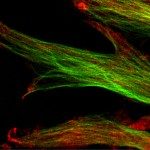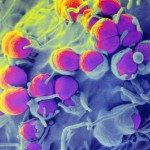Lien vers Pubmed [PMID] – 26122844
Cancer Res. 2015 Aug;75(16):3279-91
The metabolic sensor mTOR broadly regulates cell growth and division in cancer cells, leading to a significant focus on studies of rapamycin and its analogues as candidate anticancer drugs. However, mTOR inhibitors have failed to produce useful clinical efficacy, potentially because mTOR is also critical in T cells implicated in immunosurveillance. Indeed, recent studies using rapamycin have demonstrated the important role of mTOR in differentiation and induction of the CD8+ memory in T-cell responses associated with antitumor properties. In this study, we demonstrate that rapamycin harms antitumor immune responses mediated by T cells in the setting of cancer vaccine therapy. Specifically, we analyzed how rapamycin affects the antitumor efficacy of a human papilloma virus E7 peptide vaccine (CyaA-E7) capable of eradicating tumors in the TC-1 mouse model of cervical cancer. In animals vaccinated with CyaA-E7, rapamycin administration completely abolished recruitment of CD8+ T cells into TC-1 tumors along with the ability of the vaccine to reduce infiltration of T regulatory cells and myeloid-derived suppressor cells. Moreover, rapamycin completely abolished vaccine-induced cytotoxic T-cell responses and therapeutic activity. Taken together, our results demonstrate the powerful effects of mTOR inhibition in abolishing T-cell-mediated antitumor immune responses essential for the therapeutic efficacy of cancer vaccines.





